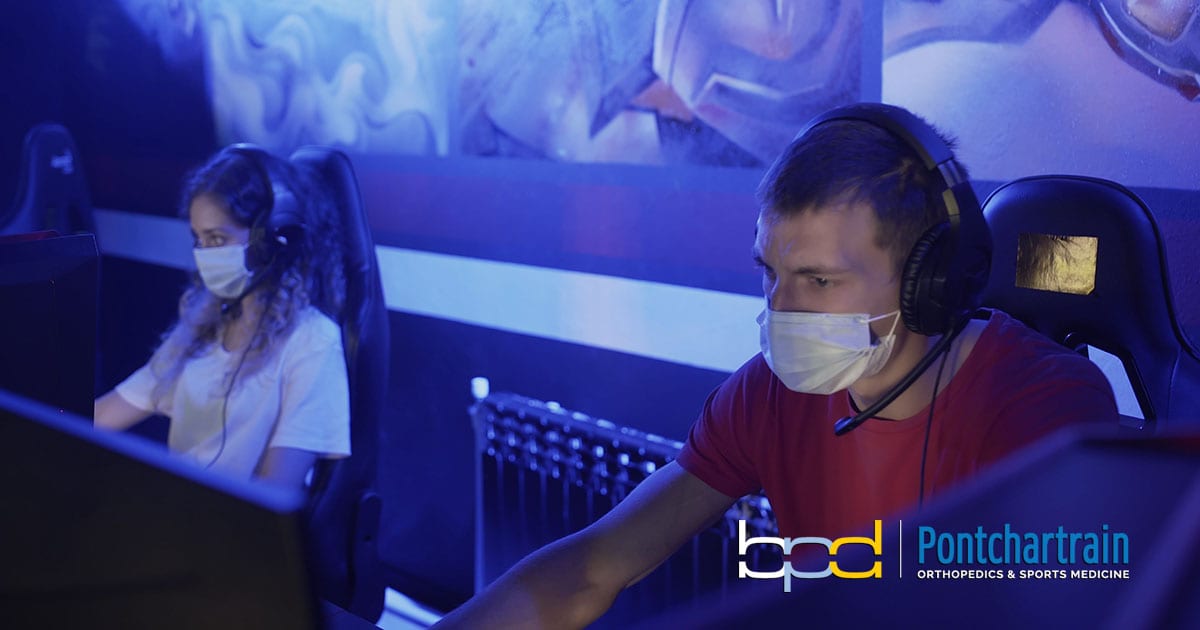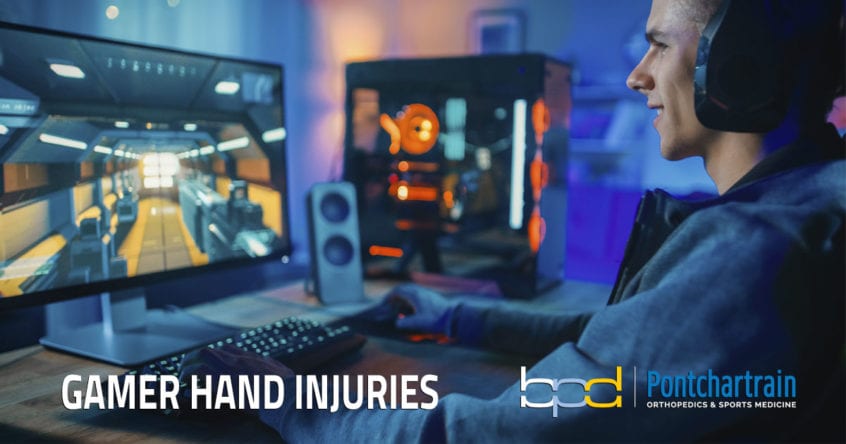
Hand specialists are seeing more and more overuse-related injuries with members of the gaming community. While the games may be computer generated, the resulting injuries and pain are very real – and they might require IRL medical attention. In today’s blog post, Dr. Brandon Donnelly discusses some growing issues related to video game hand injuries, and possible treatment options.
Virtual Sports Generate Real Money
Electronic sports, or eSports, aren’t just an amateur hobby anymore. It’s estimated that millions of players take part in competitive gaming, with some becoming paid professionals. According to a recent article in The Street, eSports players can win single-game cash prizes up to $200,000, team salaries averaging $2,000-to-$5,000 per month, and compete for a slice of the over $456 million dollars in sponsorship money. U.S. colleges are even getting into the game by introducing varsity gaming teams with eSports scholarships.
All that money on the line means eSports competitors are taking their training seriously, and increasing their risk of video game hand injuries. The average college or pro competitor can be at the gaming console between 5 and 10 hours a day. However, this is not only occurring in professionals. Time spent in front of a computer is rapidly growing among amateurs, too.

As Training Ramps Up, So Do Video Game Hand Injuries
As eSports develops into a real career path for players, video game hand injuries are also on the rise. Like many repetitive injuries, icing and over-the-counter medications can help gamers alleviate related pain. However, as more serious conditions develop, eAthletes often are challenged with finding ergonomic adaptations, and braces that relieve the pain without compromising their training. If the pain becomes debilitating, gamers might have to stop competing for a period of rest, or start physical therapy. Sometimes, surgical options become necessary. Below are the most commonly reported video game hand injuries:
Tendonitis
Emerging from the forearm muscles, wrist and hand, tendonitis is related to repetitive motion. The flexor and/or extensor tendons become inflamed because of overuse, causing pain, stiffness, swelling and tenderness. During the heyday of the Nintendo Wii, ulnar-sided tendonitis was sometimes referred to as a “Wii wrist.” As gaming consoles change, so do the types of video game hand injuries players may experience. Associated symptoms of tendonitis can often be effectively treated with nonsurgical options like activity modification, splinting or bracing, anti-inflammatory drugs, cortisone injections or physical therapy.
Gamer's Thumb
Also known as De Quervain’s Tendinitis or tenosynovitis, “gamer’s thumb” happens when tendons on the thumb side of the wrist become irritated or constricted because of overuse. Typical symptoms include swelling, numbness in the thumb and index finger, a catching or popping sensation felt when moving the wrist and or thumb, or pain when you turn the wrist, use the joystick or make a fist. Mild cases of De Quervain’s Tendinitis can be treated with a splint to reduce movement, and physical therapy. As is the case with many video game hand injuries, patients may be prescribed a non-steroidal anti-inflammatory drug or steroid injections, and a combination of rest or modification of daily activities. In the most severe cases, an operation that involves surgically opening the thumb compartment to alleviate pressure may be needed. Learn More About De Quervain’s Tendinitis
Carpal Tunnel Syndrome
Essentially a nerve being pinched in the wrist, carpal tunnel syndrome can be aggravated by lengthy gaming sessions. Patients might experience tingling and numbness in the hand, and pain in the wrist, particularly at night. Several different issues factor into this build up of pressure on the nerve, including tenosynovitis (or swelling of the lining of the tendons), injuries, arthritis fluid retention, related health conditions like diabetes or a thyroid gland imbalance, and a hereditary instance of smaller carpal tunnels. Gamers suffering from CTS are typically encouraged to modify activity, and might be given anti-inflammatory drugs, an over-the-counter prescription or corticosteroid injections. If symptoms are not relieved, surgery could be necessary. A 10 to 15-minute outpatient procedure decreases pressure with a small incision to the ligament that forms the top of the tunnel. Learn More About Carpal Tunnel Syndrome
Concerned About Video Game Hand Injuries?
Are you or someone you care about suffering from one of the video game hand injuries we discussed today? Often, the best treatment is simply to change the duration of play – and to take more frequent breaks. If you think you have a more serious issue, however, an evaluation by a hand, wrist and elbow specialist may be in order. Contact Dr. Donnelly’s office today to set up an appointment.
About Dr. Brandon P. Donnelly, MD
 Dr. Brandon P. Donnelly is a board certified orthopedic surgeon with Pontchartrain Orthopedics & Sports Medicine. Dr. Donnelly completed his hand and microsurgery fellowship at the prestigious Philadelphia Hand to Shoulder Center. Dr. Donnelly treats all ages of patients in the greater New Orleans area for hand, wrist, and elbow conditions.
Dr. Brandon P. Donnelly is a board certified orthopedic surgeon with Pontchartrain Orthopedics & Sports Medicine. Dr. Donnelly completed his hand and microsurgery fellowship at the prestigious Philadelphia Hand to Shoulder Center. Dr. Donnelly treats all ages of patients in the greater New Orleans area for hand, wrist, and elbow conditions.
This site is not intended to and does not provide medical advice, professional diagnosis, opinion, treatment or services to you or to any other individual. Through this website and links to other websites, Brandon P. Donnelly, MD provides general information for educational purposes only. The content provided in this website and links, is not a substitute for medical care or treatment. You should not use this information in place of a consultation or the advice of your healthcare provider. Brandon P. Donnelly, MD is not liable or responsible for any advice, course of treatment, diagnosis or any other information, services or product you obtain through this site.

